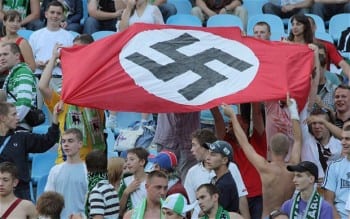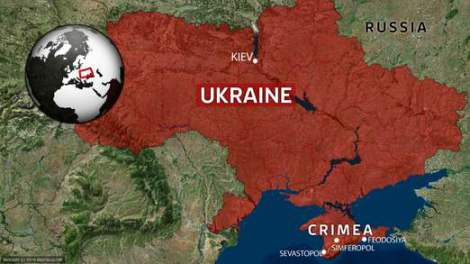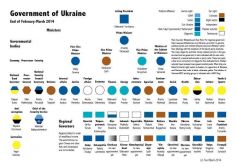Eastern Ukrainian Resistance
By Stephen Lendman
Thousands of Eastern Ukrainians reject Kiev putschists. Perhaps millions. They want local sovereignty. They want autonomy rights. They want them respected. They reject fascist rule. They demand their own referendum. They want Ukraine federalized.
Protests continue in Kharkov (Ukraine’s second largest city), Donetsk (its largest industrial city), Dnepropetrovsk, Lugansk, Odessa, Nikolayev and elsewhere. They’re growing. They’re spreading. They have legs. Maybe parts of Western Ukraine will join them.
Ukrainians are long-suffering. They rejected Orange Revolution rule years earlier. Perhaps Orange Revolution 2.0 won’t fare better. It remains to be seen what happens going forward.
Will Eastern Ukrainian resistance spread? Will it do so nationwide? Will Ukrainians overwhelmingly reject fascist/predatory IMF rule? Will they demand equitable change? Will they protests en masse like before? Will they sustain it long enough to matter? Will they refuse what demands rejection?
Eastern Ukrainians reacted first. On April 7, RT International headlined “Pro-Russian protesters seize govt buildings in Ukraine’s Donetsk, Lugansk and Kharkov.” Included was Donetsk’s Security Service building. “The people’s militia seized Ukraine’s Security Service in 15 minutes, at 3:32 in the morning,” its members said.
THE SAME EVENT AS PRESENTED BY THE AMERICAN MEDIA (CBS This Morning, 4.9.14)
Pls. disregard the inevitable pollution (ads)
It’s blocked to protect against local security forces. On Sunday, thousands rallied in Eastern Ukrainian cities. They flooded streets. They waved Russian flags. They chanted “Russia! Russia!” They demanded local sovereignty. They called Kiev putschists an “illegal junta.” They demand Kiev appointed governor/oligarch Sergey Taruta “get out.” They burned a Nazi zealot’s effigy publicly.
They called doing so “an act of annihilation of fascism.” Clashes with police broke out. Protesters seized their riot shields. They entered the Security Service building. They replaced the Ukrainian flag with the Russian one.
According to activist Aleksandr Borodin:
“The situation is pretty tense. The demonstrators are occupying the city council building and are demanding that an independence referendum is held to determine the future of the region of Donetsk. The protesters are calling on officials to conduct a special session over the referendum situation…If it doesn’t take place, the demonstrators say they will organize an initiative group to settle the issue.”
They won’t “acknowledge the Kiev-appointed authorities and are also demanding freedom for the recently elected so-called ‘public governor.’ ”
On April 7, Itar Tass headlined “Legislature of just proclaimed Donetsk People’s Republic asks Putin move in peacekeepers.”
They formed a Republican Council of the Donetsk’s People’s Republic. They adopted legislation saying:
“The territory of the republic within the recognized borders is indivisible and inviolable.”
They ruled on holding a referendum. They’ll do so no later than May 11. They’ll decide whether or not to join Russia. “On March 1,” said Itar Tass, “Russia’s Federation Council gave its consent to the president for using the armed forces on the territory of Ukraine.”
“The relevant decision was unanimously adopted by the upper house of Russian parliament at an extraordinary session. Earlier, Vladimir Putin submitted to the Federation Council an address on using the armed forces of Russia on the territory of Ukraine until the normalization of the socio-political situation in that country.”
“This initiative was proposed with regard to a plea by Ukraine’s legitimate president Viktor Yanukovych.” At issue is protecting the security of Russian-speaking nationals. It’s securing their rights. Lugansk events are unfolding like Donetsk’s, said RT. Around 1,000 people rallied outside the local Ukrainian Security Service (SBU) building. They demand protest leader Aleksandr Kharitonov’s release. He’s been lawlessly detained since mid-March.
So were 15 pro-Russian activists on Saturday. People carried Russian flags. They chanted “Shame on the SBU.” “Freedom to political prisoners.”
Clashes erupted. Injuries were reported. Kiev appointed governor released six anti-putschist activists. Violence erupted in Kharkov. Pro-Russian protesters clashed with Right Sector extremists. Police separated both sides. No injuries were reported.
Around 1,500 pro-Russian supporters occupied the putschist UNIAN news agency building.
According to RT:
“Pro-Russian rallies are taking place almost every weekend in major cities in the Russian-speaking part of Ukraine since the nationalist coup ousted Ukrainian president, Viktor Yanukovich, in late February.”
Things remain fluid. The struggle for Ukraine’s soul continues. RT highlighted Donetsk activists declaring a local republic. They want one independent from Kiev. They reject putschist rule. They want legal governance replacing it. They proclaimed their Regional Council the sole legitimate governing body. They did so pending a planned referendum. It’ll be held by May 11 or sooner. Ukrainian activism is spreading. So far in Eastern cities. Perhaps nationwide soon.
At the same time, Russia bashing continues relentlessly. So do US-led Western efforts to marginalize, isolate, weaken and contain Moscow. Political and military cooperation was suspended. Other options include positioning US-led NATO forces closer to Russia’s border. Provocative military exercises are planned. Challenging Moscow is madness. It’s happening in real time. It’s escalating dangerously. Doing so risks potential major conflict madness.
A previous article discussed Zero Hedge headlining “Petrodollar Alert: Putin Prepares to Announce ‘Holy Grail’ Gas Deal With China,” saying:
If Washington and EU partners intended greater Sino/Russian unity, “one (nation) a natural resource…superpower and the other a fixed capital/labor output…powerhouse, in the process marginalizing the dollar and encouraging Ruble and Renminbi bilateral trade, then things are surely ‘going according to plan.’ ”
Moscow/Beijing unity against Western imperialism is their best defense. Conditions head both nations more closely together against it. Russia is preparing a “Holy Grail” energy deal with China. Doing so will send “geopolitical shockwaves around the world,” said Zero Hedge. It’ll lay “groundwork for a new joint, commodity-backed reserve currency…” It’ll bypass dollar transactions. It’ll weaken petrodollar strength.
Moscow’s “Holy Grail” is a major natural gas deal with Beijing. Negotiations are close to complete. It involves supplying 38 billion cubic meters of natural gas annually. It’ll do so via pipeline. It’s the first one between both nations. Putin plans visiting China in May. He’s expected to close the deal. The more Western nations pressure Russia, the closer it’s drawn to China. Bilateral ruble/renminbi trade weakens dollar strength. Perhaps other countries may follow in their own currencies. India and Iran are prime candidates. Perhaps Brazil and others will follow suit. Washington reacted as expected. According to Zero Hedge, it threatened Russia. It did so over a “petrodollar-busting deal.” It warned against “possible oil barter(ing)” transactions. It warned Iran against them. US-led Western sanctions are counterproductive. Perhaps Washington shot itself in the foot.
Russia has plenty of retaliatory ammunition. What better way than by weakening petrodollar strength. It’s a pillar of America’s geopolitical/military might. It furthers US supremacy. It does so at the expense of other nations. It finances America’s global military machine. It advances US imperialism. It furthers financial speculation.
It facilitates corporate takeovers. It does so at the expense of beneficial social change, human and civil rights. It prevents potential democratic change outbreaks. Global central banks recycle dollar inflows. They do so into US Treasuries. They finance America’s deficit. It matters with QE diminishing. Perhaps ending. Moscow/Beijing bilateral trade in their own currencies “is rapidly turning out into a terminal confirmation of (US) weakness,” said Zero Hedge.
“Russia seems perfectly happy to telegraph that it is just as willing to use barter (and perhaps gold) and shortly other ‘regional’ currencies, as it is to use the US Dollar,” it added.
It’s “hardly the intended outcome of the western blockade, which appears to have just backfired and further impacted the untouchable status of the Petrodollar. If Washington can’t stop this deal,” perhaps others will follow. Perhaps a groundswell among leading nations.
Petrodollar trading gives America major unfair advantages. According to Voice of Russia, “Moscow is ready to take (them) away.”
So is China. Imagine a combination petroruble/petrorenminbi weakening petrodollar strength. Imagine other petrocurrencies doing it further. Imagine petrodollar becoming a shadow of its former self. Imagine destructive US policies waning. Imagine a world safer to live in. Imagine a fairer one. Imagine what won’t happen easily or soon. Imagine what one day perhaps is possible. Top Russian officials support petrodollar weakening.
Economy Minister Alexei Ulyukaev urged Russian energy companies to ditch the dollar. “They must be braver in signing contracts in rubles and (partner country) currencies,” he said. Last month, VTB CEO Andrei Kostin said gas giant Gazprom, state-own oil company Rosneft, and exclusive defense-related weapons/ technologies/dual-use products/and services company Rosoboronexport “can start trading in rubles.”
They don’t mind switching, they said. They need a “mechanism” to do so. Russian upper house Federation Council Speaker Valentina Matviyenko said no efforts will be spared to create one. Putin intends challenging Washington responsibly. Chinese leader Xi Jinping appears willing to join him. Together they’re a formidable combination.
Perhaps Moscow/Beijing commodity exchanges will exclude dollar transactions. Maybe they’ll replace them with ruble/renminbi ones. Rosneft signed large oil contracts with China. It’s close to major ones with Indian companies. They exclude dollar transactions. Russia heads toward trading goods for oil with Iran. If Rosneft deals in rubles, petrodollar strength will suffer. According to Zero Hedge, “US sanctions have opened a Pandora’s box of troubles for the American currency.” Russian retaliation promises unpleasant consequences.
What if other countries follow Russian and Chinese examples? What if avoiding dollar transactions catches on? What if long prevented US comeuppance happens? What if America met its match? What if it’s responsibly weakened? The sound you hear is overwhelming popular approval.
ABOUT THE AUTHOR
Stephen Lendman lives in Chicago. He can be reached at lendmanstephen@sbcglobal.net. His new book is titled “Banker Occupation: Waging Financial War on Humanity.”
http://www.claritypress.com/LendmanII.html
Visit his blog site at sjlendman.blogspot.com.
Listen to cutting-edge discussions with distinguished guests on the Progressive Radio News Hour on the Progressive Radio Network. It airs three times weekly: live on Sundays at 1PM Central time plus two prerecorded archived programs.
http://www.progressiveradionetwork.com/the-progressive-news-hour






